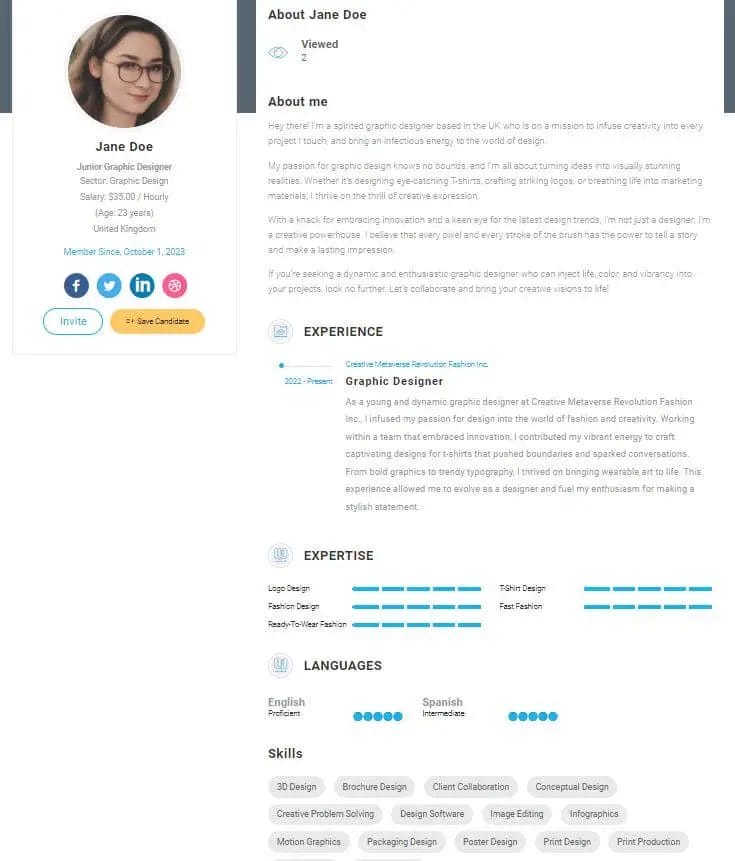Are you a job seeker looking for a remote job online where you can work from home or anywhere you want?
Today, there are hundreds of remote job sites offering remote part-time job, full-time job or freelance jobs to talented job seekers interested in working remotely.
Even with minimal experience or no experience at all, you can leverage any transferable skills you have and to showcase your ability to work independently and effectively in a remote environment.
With thoughtful preparation and a strategic approach, you can position yourself as a strong candidate for a remote role.
KEY TAKEAWAY
- Position yourself as a viable candidate by highlighting any relevant skills and showing a propensity for independent work.
- Expand your knowledge and competencies specific to remote work to increase employability in a competitive market.
- Utilize online job platforms to find and apply for remote roles suitable for your level of experience.
How to Get a Remote Job and Start Your Remote Careers with Little to No Experience
Starting with entry-level or freelance positions can serve as an excellent stepping stone to land a remote job in top remote companies.
Finding a remote job opportunity can be done by,
- Focusing on expanding your skill set
- Build a strong online profile and portfolio
- Understanding the nuances of virtual interviews
With that, you can greatly increase your chances of success.
As remote work continues to thrive, remote job board and remote job listing sites will offer a convenient way to connect with potential employers and uncover roles that match your current capabilities.
Step 1. Identifying Remote Career Opportunities

As we evolves from the traditional job to a remote work culture, discovering remote career opportunities requires a strategic approach to the job market and an awareness of the roles.
This is especially true if you are without much experience.
Understanding the Remote Job Market
When starting your search for a remote job, it’s vital to first comprehend the breadth and scope of the remote job market. As many companies are transitioning to fully remote or hybrid models, the variety of work-from-home jobs has expanded significantly.
Entry-level jobs often don’t require extensive experience but may necessitate a proficiency in certain skills or tools.
Regularly visit job boards and platforms dedicated to remote positions to stay informed about the latest opportunities.
Popular Remote Roles for Beginners
While there are many good remote roles for beginners, here are some of the most popular ones:
- Data Entry: With a focus on speed and accuracy, data entry roles are a common starting point for those looking to find remote work with little to no prior experience.
- Social Media Manager: If you have a knack for creating engaging content and a solid grasp of different social platforms, beginning as a social media manager can be an accessible entry into remote work.
- Sales Jobs: If you like to sell and have the ability to communicate effectively and with good persuasion skills, then a sales job is a good place to start.
Highlight your transferable skills and any relevant experience during your application process to stand out, even if your remote work experience is limited.
Step 2. Building Your Skillset for Remote Jobs

Whether you’re aiming to become a graphic designer or a content writer, building a robust skillset is critical for securing a remote job.
It’s about more than having specific technical skills; you need an array of transferable skills that apply across various jobs and industries.
Essential Skills for Remote Workers
Your journey to becoming a successful remote worker relies heavily on key transferable skills. Here’s a quick look at what you should focus on:
- Communication Skills: Effective communication is paramount. This includes both written and verbal skills, as you’ll often depend on email, chat, and video calls to collaborate with your team.
- Attention to Detail: As a remote worker, your ability to catch errors and maintain high-quality work will help you stand out.
- Time Management: Managing your time efficiently is a must-have skill to meet deadlines and balance workload without direct supervision.
This list isn’t exhaustive, but it’s a solid foundation to build upon. Remember, the skills you nurture now will help you thrive in any remote role you take on.
Leveraging Online Courses and Certifications
To fill the gaps in your skillset or learn something new like graphic design or content creation, online courses and certifications can be your best ally. Here’s how to make the most of them:
- Identify key skills needed for your desired job.
- Research and enroll in online courses that offer practical, job-related training.
- Aim for certifications that can bolster your resume and prove your competency to potential employers.
Platforms like Coursera offer a variety of courses that can help you acquire the skills necessary for a remote job. Engaging in these learning opportunities shows employers that you’re proactive and dedicated to your professional development.
Step 3. Building an Online Presence
Creating an online presence can prove invaluable. Construct an online portfolio that exhibits your work, such as projects or case studies, to provide tangible evidence of your capabilities.
Utilize platforms like LinkedIn, HQHIRE or other Job search sites to network and connect with industry professionals and potential employers:
- Talent Profile: Ensure it’s up-to-date, with a professional photo, comprehensive work history, and a headline that reflects your job search for remote opportunities.
- Personal Portfolio: Use a simple layout to showcase your work. Include links that lead directly to your best work and clearly label each project.
By methodically addressing each of these areas, you expedite your online reputation and online presence which can help you in your growth in your remote career.
Of these suggestions, your talent profile speaks volume, thus it is always a good practice to update it and keep it fresh even when you are not actively looking for a job.
It is like your online storefront, where you “promote yourself” to any potential remote employers.
You might be surprised that some great remote companies may start contacting you can offer you a dream remote job.
Step 4. Crafting Your Remote Job Application

To secure a remote job, especially when you have minimal experience, crafting a standout application is crucial.
Your application must be tailored to demonstrate your potential as a remote worker, showcasing transferrable skills and a self-starter mindset.
Creating a Winning Online Resume
Your resume is your first chance to make a lasting impression. Start by listing your relevant skills and experience that align with the remote position.
For example, if you’re seeking to find a full-time virtual assistant role, highlight organizational skills, proficiency in communication tools, and time management abilities.
In your resume, use bullet points for clarity:
- Skills: Clearly itemize skills, such as proficiency with remote communication platforms (e.g., Slack, Zoom).
- Experience: Adapt previous job roles to emphasize transferable skills.
- Achievements: Quantify your accomplishments to showcase your value.
Writing an Engaging Cover Letter
An engaging cover letter can set you apart in your job search.
- Start with a compelling introduction that reflects your enthusiasm for the role and the company.
- Then, make the connection with your current experience.
- Finally, explaining how your background, even if in different industries or roles, provides value to a remote job role.
Demonstrate how you’ve adapted to changes and solved problems — these are key attributes for remote employees.
- Introduction: Grab attention with a personal connection to the job or company.
- Relevance: Highlight specific examples from past experiences that relate to the remote job you’re applying for.
- Stand Out: Identify your unique skills or experience that makes you start out from the other candidates.
Step 5. Navigating the Job Search and Application Process

In your quest for a remote job, especially with little to no experience, understanding how to effectively navigate job boards, network, and apply to the right positions is crucial.
Grasping the nuances of the recruitment process will also enhance your chances of success.
Utilizing Job Boards and Networking
Begin by identifying job boards that specialize in remote opportunities. Leverage platforms like HQHIRE, FlexJobs and Remote.co, as they often list a variety of remote job postings.
In addition, don’t underestimate the power of professional networking sites like LinkedIn, where you can connect with industry influencers and potentially find remote jobs indirectly through your network.
- Create talent profiles on multiple job boards to maximize visibility.
- Update your talent profile which also serve as your online resume regularly.
- Join networking groups like LinkedIn and follow companies you’re interested in to stay informed about new openings.
Applying for the Right Positions
When you apply for a job, be strategic. Focus on roles that fit your skill set and have clear pathways for progression.
Even if you lack experience, look for entry-level positions that offer training.
Tailor your resume and cover letter for each application, incorporating keywords from the job descriptions to pass through applicant tracking systems.
- Draft a personalized cover letter for each role, highlighting your adaptability and willingness to learn.
- Utilize bold and italic formatting to emphasize key skills and experiences in your resume.
Understanding the Recruitment Process
Familiarize yourself with the common stages of remote job recruitment, which may include initial screenings, video interviews, and skills assessments.
Companies use applicant tracking systems (ATS) to manage applications, so be sure your resume is clear and formatted in a way that is easily parseable by these systems.
- Pay attention to follow-up instructions and timeframes for each stage of the recruitment process.
- Prepare for virtual interviews by testing your technology and ensuring you have a professional background and attire.
Step 6. Succeeding in Remote Interviews

To excel in remote interviews, you need to demonstrate clear communication skills and showcase your capabilities for remote work effectively.
Preparing thoroughly and understanding how to present yourself as a valuable remote worker are crucial steps.
Preparing for Virtual Interviews
- Technical Setup: Ensure your internet connection is stable, test your webcam and microphone, and familiarize yourself with the video conferencing platform in advance. Choose a quiet, well-lit setting for the interview to avoid distractions and make a good visual impression.
- Dress Professionally: Just like an in-person interview, dress appropriately for your remote interview. This shows the employer your professionalism and ability to fit into their team.
- Research the Company: Understand the company’s culture, mission, and the role you’re applying for. Prepare to answer questions related to the company and how you can contribute to its objectives as a remote employee.
- Practice Responses: Anticipate common interview questions and practice your answers. Highlight experiences that demonstrate your independence and proactive nature, as these are highly valued in remote roles.
Showcasing Remote Work Capabilities
- Communication Skills: Clearly articulate your thoughts and show that you can convey complex information succinctly. Strong written and verbal communication skills are vital for remote work, and you’ll want to demonstrate these during the interview.
- Familiarity with Tools: Mention your proficiency with common communication tools like Slack and Zoom to show that you’re an adept remote worker. Discuss how you’ve used these tools in previous experiences or how you’re actively improving those skills.
- Show Initiative: Explain how you’ve managed projects or tasks independently in the past, showing the hiring manager that you’re initiative-taking and self-motivated, which are key traits for a remote worker.
Step 7. Have the Right Mindset
Your mindset is key to success in getting hired in the perfect remote job.
Cultivate a Positive Outlook
Approach your remote job search with optimism and a positive mindset.
- Understand that the process may take time.
- Understand that setbacks are opportunities to learn and grow.
A positive attitude not only impacts your mental well-being but is also palpable to potential employers during interviews.
Embrace Adaptability
The world of remote work is dynamic, with new technologies and work methodologies emerging regularly, you need to adapt quickly to stay relevant in the game.
Cultivate a mindset of adaptability.
Show your employers that you’re not just equipped with current skills but are also open to learning and evolving with the demands of the remote work culture.
Stay Persistent in Your Pursuit
Securing a remote job may require persistence, particularly when faced with initial challenges or rejections.
Keep refining your approach, learning from each application or interview experience.
Persistence often differentiates successful remote job seekers from the rest.
Visualize Your Remote Career Goals
Take the time to visualize your remote career goals.
- What does your dream remote job look like?
- What remote job type are you looking for?
- How does success look to you?
Envisioning your destination can provide motivation and direction as you navigate the sometimes intricate path to remote employment.
Whether it’s achieving a leadership role or mastering a specific skill set, having clear goals guides your remote career journey.
Seek Continuous Improvement
Ah-hah! Ever heard of the phase, “Live till old, learn till old”?
Maintain a growth mindset by consistently seeking opportunities for improvement can help you accelerate your remote career.
Whether it’s honing existing skills, acquiring new ones, or enhancing your understanding of the remote work landscape, the pursuit of continuous improvement positions you as a proactive and valuable candidate in the eyes of remote employers.
Be Resilient in the Face of Challenges
Remote job searching may pose its share of challenges, from intense competition to the occasional uncertainty.
Build resilience to overcome setbacks, learning from each experience and using it as fuel for future success.
Resilience is a trait highly valued in remote workers, showcasing your ability to thrive in diverse and sometimes unpredictable work environments.
Stay Informed About Remote Trends
Cultivate a mindset of staying informed about remote work trends and industry shifts.
Infact, we’ve compiled a whole list of important trends and statistics about remote work which you can read in our “remote work statistics” article here.
Subscribe to newsletters, join online communities, and follow thought leaders in the remote work sphere.
Being well-informed not only enhances your understanding of the job market but also positions you as someone who actively engages with the evolving nature of remote work.
Ready To Take The Challenge and Find Your Dream Remote Job?
By strategically preparing and demonstrating your ability to effectively operate in a remote environment, you can make a compelling case for yourself as the right candidate for a remote role.
Yes, even with little to no experience.
Let’s get started by creating your own talent profile below.
Get your 100% Free online resume and get noticed by potential employers. Start out of the crowded space of millions of remote job seekers and find the remote job that you will enjoy and love.

Read Also:
- 20 Online Meeting Etiquette in The Workplace (Remote Work)
- How to Host Effective Online Meeting (Beginner’s Guide)
- Online Meetings in the Workplace (Complete Guide)
- +15 Best Webinar Software for Business and Workplace (Live & Automated)
- Best Practices For Confirming a Meeting
Join over 11,000+ achievers who are committed to achieving their career goals!






